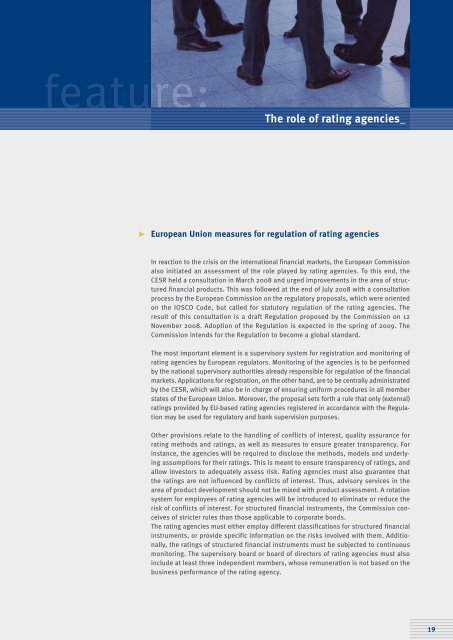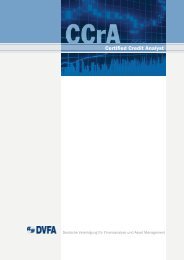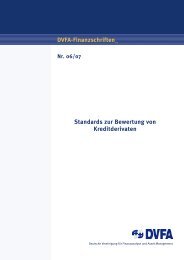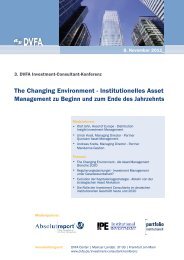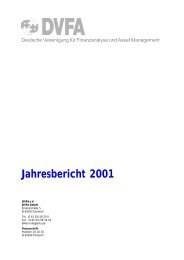Gb08_engl Umschlag:GB 2005 - DVFA
Gb08_engl Umschlag:GB 2005 - DVFA
Gb08_engl Umschlag:GB 2005 - DVFA
- TAGS
- dvfa
- www.dvfa.de
You also want an ePaper? Increase the reach of your titles
YUMPU automatically turns print PDFs into web optimized ePapers that Google loves.
featu The role of rating agencies_<br />
Equities_<br />
u<br />
European Union measures for regulation of rating agencies<br />
In reaction to the crisis on the international financial markets, the European Commission<br />
also initiated an assessment of the role played by rating agencies. To this end, the<br />
CESR held a consultation in March 2008 and urged improvements in the area of structured<br />
financial products. This was followed at the end of July 2008 with a consultation<br />
process by the European Commission on the regulatory proposals, which were oriented<br />
on the IOSCO Code, but called for statutory regulation of the rating agencies. The<br />
result of this consultation is a draft Regulation proposed by the Commission on 12<br />
November 2008. Adoption of the Regulation is expected in the spring of 2009. The<br />
Commission intends for the Regulation to become a global standard.<br />
The most important element is a supervisory system for registration and monitoring of<br />
rating agencies by European regulators. Monitoring of the agencies is to be performed<br />
by the national supervisory authorities already responsible for regulation of the financial<br />
markets. Applications for registration, on the other hand, are to be centrally administrated<br />
by the CESR, which will also be in charge of ensuring uniform procedures in all member<br />
states of the European Union. Moreover, the proposal sets forth a rule that only (external)<br />
ratings provided by EU-based rating agencies registered in accordance with the Regulation<br />
may be used for regulatory and bank supervision purposes.<br />
Other provisions relate to the handling of conflicts of interest, quality assurance for<br />
rating methods and ratings, as well as measures to ensure greater transparency. For<br />
instance, the agencies will be required to disclose the methods, models and underlying<br />
assumptions for their ratings. This is meant to ensure transparency of ratings, and<br />
allow investors to adequately assess risk. Rating agencies must also guarantee that<br />
the ratings are not influenced by conflicts of interest. Thus, advisory services in the<br />
area of product development should not be mixed with product assessment. A rotation<br />
system for employees of rating agencies will be introduced to eliminate or reduce the<br />
risk of conflicts of interest. For structured financial instruments, the Commission conceives<br />
of stricter rules than those applicable to corporate bonds.<br />
The rating agencies must either employ different classifications for structured financial<br />
instruments, or provide specific information on the risks involved with them. Additionally,<br />
the ratings of structured financial instruments must be subjected to continuous<br />
monitoring. The supervisory board or board of directors of rating agencies must also<br />
include at least three independent members, whose remuneration is not based on the<br />
business performance of the rating agency.<br />
19


